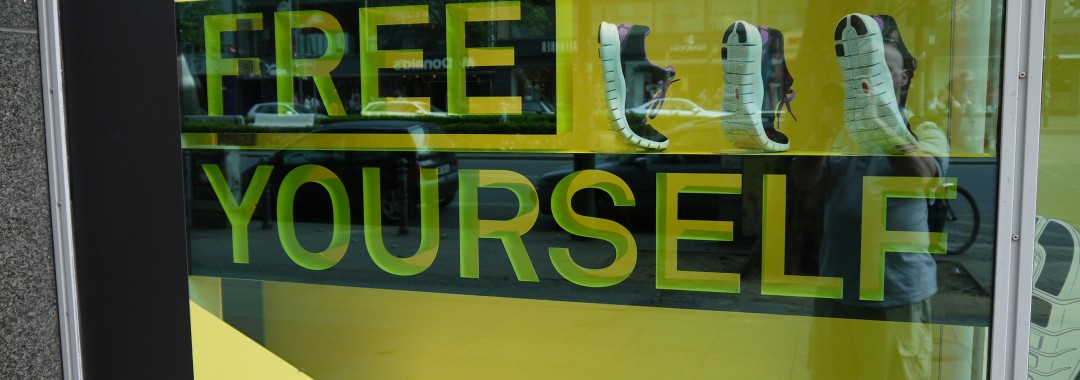(The English text is after the Finnish one)
Arvokkainta maailmassa on tieto. Kaupalle arvokasta on asiakastieto. Asiakastietoa kauppa hankkii tarjoamalla asiakkailleen etuja siitä hyvästä, että he luovuttavat tietojaan kaupalle. Meillä Suomessa on kauhisteltu sitä, miten paljon kauppa kerää meistä ja meidän käyttäytymisestämme tietoa, vaikka olemme toivottaneet runsaat bonukset ja Plussa-setelit kyllä tervetulleeksi. Minusta tämä on hiukan tekopyhää. Itse ainakin luovutan mielelläni ostohistoriani kaupan käyttöön, jos saan siitä mielestäni riittävän korvauksen jossain muodossa. Iso asia minulle kuitenkin on se, että luovuttamani tieto pysyy sen tahon hallussa – ja varmasti – jolle olen sen luovuttanut. Kaupan pitäisi kyetä paljon selkeämmin kertomaan asiakastiedon säilyttämisestä ja turvallisuudesta, sekä myös siitä, miten ja mihin tarkoitukseen tietoa käytetään. Ja selkeällä tarkoitan sitä, että nämä olennaiset asiat tulisi tuoda esille isosti yhdellä A4:lla, ei kätkettynä monikymmensivuisen sopimuksen syövereihin.
Koska asiakastieto on niin kauppaa kiinnostavaa, olisi mainiota, jos joku osaava taho kehittäisi kauppapaikan, alustan asiakastiedon kauppaamista varten. Asiakkaathan voisivat joka vuosi kilpailuttaa kaupat tällaisella alustan. Asiakas ilmoittaisi oman ostohistoriansa olevan tarjolla seuraavaksi 12 kuukaudeksi ja kaupat voisivat tehdä tarjouksen siitä, millä hinnalle he tiedon haluavat. Tällöin kyseessä olisi reilu peli, asiakas tietää luovuttavansa ostohistoriansa kaupalle ja kauppa kertoisi mitä he haluavat siitä maksaa.
Toinen asia on tietenkin se, jos ostohistoriatietoon yhdistetään muuta dataa eri lähteistä, kuten tietenkin nyt jo tehdään. Tästä esimerkkinä Cityconin kauppakeskusten pysäköintihallien keräämä data, jossa hyödynnetään myös Trafin rekisterinumeron kautta saatavaa tietokantaa. Kun samaa tehdään myös Väestörekisterikeskuksesta saatavan julkisen tiedon kanssa, herää tietenkin kysymys, millaista profiilia minusta voidaan rakentaa kaupan järjestelmiin. No, rehellisyyden nimissä, kun surffaan netissä, niin kaikki liikennetieto tallentuu joka tapauksessa eri tahojen tietokantoihin. Eli jos kaipaan netin ja digitaalisen maailman helppoutta ja mukavuutta, minun tulee vain hyväksyä se, että liikkumiseni digitaalisessa maailmassa on jonkun käytettävissä.
Jos tiedon hyväksikäytön ääripäät ovat foliohattu / kaiken salassapito ja toisessa päässä kaikki avointa ja kaikkien käytettävissä, sijoittunen itse jonnekin keskivaiheen ja avoimuuden puoliväliin. Uskon avoimuuteen ja läpinäkyvyyteen, mutta haluan että minun tietoni ovat vastuullisen toimijan hallussa ja tiedän mihin tietoja käytetään. Viranomaiset saavat puolestani kerätä ja hyödyntää minusta sellaista tietoa, jota he toimensa toteuttamiseksi tarvitsevat. On poliittisten päättäjien asia määritellä ja valvoa miten viranomaiset käyttävät tietoa. Minä puolestani vaikutan poliittisiin päättäjiin vaalien kautta. Kauppaa ja kaupan tiedonkäyttöä valvovat myös viranomaiset, joiden toimintaan minä luotan ja siksi en ole huolissani tietojen keräämisestä.
Tämä varmaankin kuulostaa monelle naiivilta ja optimistiselta, mutta minä uskon edelleen toimivaan demokratiaan ja siihen rakennettuihin kontrollijärjestelmiin. Jos en uskoisi, hankkisin sen foliohatun tai muuttaisin jonnekin korpeen, jossa olisin yhteiskunnan tavoittamattomissa.
My data for sale
The most valuable thing in the world is the knowledge. For the retailer the valuable knowledge is the customer data. Retailer gains customer data by providing its customers benefits so that customers allow retailer to collect and utilize the customer data. Here in Finland there has been some discussions regarding how much the retailers are collecting data an how they are using it, although we welcome the benefits that stores allow us in exchange to that data. I think that this kind of attitude is somewhat hypocritical. I willingly allow the retailer to monitor my purchase data, if I am happy with the compensation that the retailer gives to me. The big issue for me is that the data is safely stored and utilized. The retailer should clearly tell me, how the data is stored, how it is used and for what purposes. When I write clearly, I mean that the retailer should give me these facts in one A4 document – not hidden in long and complicated agreement.
Since the customer data is so valuable for the retailer, it would be splendid, if somebody could develop a platform, in which we customers could tender our purchase data to the retailers. We could say that our purchase data is for sale for the next 12-24-36 months and the retailers could tell us, how much they are paying for the data. This is fair game: I know you want my data, give me a suitable price and I give it to you.
Another issue is of course when the purchase data is combined to a data collected from other data basis. For example some malls are allowing reduced price for parking, if the customer provides some additional information, like customer’s car register number. This allows the mall to combine the car data to customer data and utilize it at least in marketing. Combining the customer data to the demographic data from other sources can create similar result and then one wonder, what kind of profile the retailer is building of me. Well, back to reality; when I surf in the web all my movement in the web is registered to many data basis. If I want to utilize the opportunities in the web, I just to approve that my data is collected.
If the extremities in approving data use are on the one end this guy with a folio hat, who lives in the forest cabin and on the other end the hipster who believes in wholly open society and really transparent data use, I am nearer the last one (well, not hipster, but regarding data use). I believe in transparent and open data use and sharing, but I want that my data is collected, saved and used by some responsible operator and that I know how my data is used. I do not mind if the authorities are collecting data of me, if they need that data to fulfil their tasks. It is for the political decision makers to define how the authorities should use that data. I control the politicians in the elections when I vote for go or now. The authorities control also the use of data in retail and I trust those authorities.
This may sound naïve and optimistic, but I trust on democracy and the control systems built into it. If I would not, I would get a folio hat and move to the wilderness.
